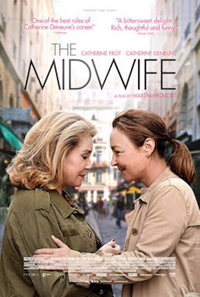Midwife Crisis: Provost Squanders Fine Cast in Trite Melodrama
 The essence of French director Martin Provost’s latest film The Midwife is supposed to revolve around the reunion of two estranged women after three odd decades despite having once shared an odd, and inevitably tragic familial bond. Unfortunately, this central relationship is sabotaged by the film’s aim to run the entire gamut of bourgeois inclined emotional notes and instead becomes a tizzy of increasingly milquetoast sketches.
The essence of French director Martin Provost’s latest film The Midwife is supposed to revolve around the reunion of two estranged women after three odd decades despite having once shared an odd, and inevitably tragic familial bond. Unfortunately, this central relationship is sabotaged by the film’s aim to run the entire gamut of bourgeois inclined emotional notes and instead becomes a tizzy of increasingly milquetoast sketches.
Not only does Provost fail to mine the offbeat subtexts of these dueling characterizations for anything other than clichéd superficialities, he somehow bafflingly wastes two renowned French stars, the iconic Catherine Deneuve and the comedic wonder Catherine Frot, each subsumed beneath a non-stop tide of banality in a middlebrow melodrama which loses sight of its eponymous heroine by showering her with extraneous subplots. What’s even more surprising is to note Provost’s track record of exceptional female characters, with items like 2008’s Seraphine and 2013’s Violette. However, these standouts in his filmography are narratives borrowing from notable historical figures in art and literature, which may explain why this original concept arrives without the same confidence or depth.
Claire is a serious but loving single mother finding herself all of a sudden at an unexpected precipice. With her adult son ready to leave home (and quite possibly medical school) to begin a family of his own, and the clinic she works at as a midwife about to be shut down after years for lack of profitability, Claire hasn’t rightly gauged the effects these changes may have on her. Before she can fathom the ramifications of either scenario, a phone call from Beatrice (Catherine Deneuve), her father’s mistress of some thirty odd years ago, suddenly commands her attention. Why Beatrice left as well as why she has returned has passing interest for Claire, if mainly to point out to the older woman her father died tragically soon after he was abandoned, and the effects were considerable upon Claire. Wishing to make amends for her own personal reasons, Beatrice ingratiates herself upon the no-nonsense midwife, while a flirtatious stranger (Olivier Gourmet) is also suddenly vying for Claire’s attention.
Frot, who is fresh off a Cesar win for Xavier Giannoli’s Marguerite (2015) is a multifaceted performer best known for her comedically inclined filmography. Her appearance as Claire the midwife, a job role currently undergoing a revamp in the bureaucratic medical profession (set to be renamed ‘birth technician’), is shown to be a passe, traditional role and one of many elements keeping Claire stuck in a care-taking capacity which hasn’t allowed her room to grow as a well-rounded woman. Bitter and restrained, she’s sought to give the love and support to those around her which she herself was denied in her own family life.
All of this significant psychological baggage primes us for a stellar character study, but Provost consistently tells rather than shows and settles for a series of interactions between a flinty Frot and a bemused Deneuve. As the otherwise comedic support, Deneuve is frothy and sometimes fun, though clearly doesn’t ever appear to be in the sort of physical distress a tumor in the brain requiring invasive surgery would indicate. Likewise, for a film so firmly planted in the medical realm, several childbirth sequences seem sloppily staged, babies either soaked in postnatal goop or ejected from the womb instantly air-dried.
Sequences with Frot and Deneuve are arguably salvageable, but The Midwife loses steam with supporting characters, and allows for an unnecessarily extended running time of nearly two hours. Olivier Gourmet is sweet as Claire’s constant gardener next door (the only place she seems excited to visit outside of work) and they share some cutesy vegetation related dialogue, but this gets tiring quickly. Worse, as her son, Quentin Dolmaire (of Desplechin’s My Golden Days, 2015) appears as the doppelganger for Frot’s dead father, which is rather clumsily relayed for corny effect. A last minute cameo from Pauline Etienne as the last woman to show up to give birth in the clinic, where she herself had been born thanks to a supreme intervention from Frot twenty odd years before, is also mawkishly sentimental.
Waxing enthusiastically over all of this happens to be an otherwise lovely score from Gregoire Hetzel, a repeated refrain begging to be the shiny varnish over something more meaningful than what’s accomplished here.
Reviewed on February 14 at the 2017 Berlin International Film Festival – Competition. 117 Mins.
★★/☆☆☆☆☆


